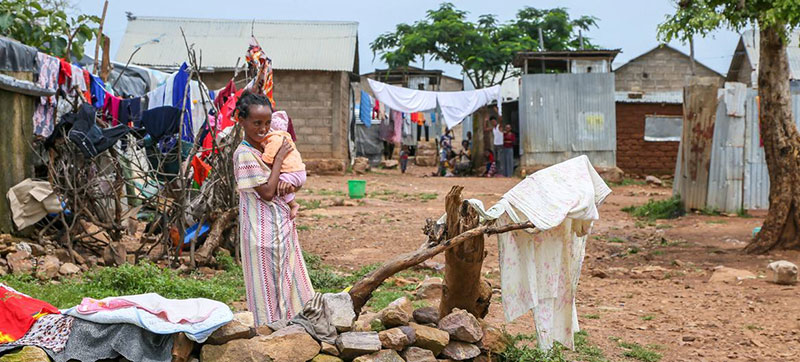 Tigray Refugees
Tigray Refugees Tigray: Eritrean refugees ‘scared and struggling to eat’ amid aid obstacles
New York: For the first time in weeks, aid teams have reached refugee camps in Ethiopia’s Tigray region, only to find that some Eritrean nationals living there have likely died of preventable diseases, while others are “scared and struggling to get enough to eat”, the UN Refugee Agency, UNHCR, said on Friday.
More than 25,000 refugees live in in Mai Aini and Adi Harush refugee camps in Tigray, where UNHCR has urged all parties to the conflict to guarantee safe passage, so that they can be relocated to the neighbouring Amara region.
“After three weeks with no access due to the security situation, UNHCR staff members managed to reach Mai Aini and Adi Harush refugee camps in the Tigray region of Ethiopia earlier this week for the first time, since the recent air strikes in and near the camps,” said Boris Cheshirkov, UNHCR spokesperson. “Our team found refugees scared and struggling to get enough to eat, lacking medicine and with little or no access to clean water.”
No fuel, water, medicines
The work of humanitarians has been hindered by a lack of fuel, preventing clean water from being pumped in or trucked to the camps. This has left refugees with no option but to drink from streams that are rapidly drying up, leaving them vulnerable to water-borne diseases.
“Despite concerted efforts, the complete inability to move supplies into the region means that extreme hunger is an increasing concern,” Mr Cheshirkov told journalists via a virtual briefing in Geneva, adding that more than 20 people had reportedly died in the last six weeks alone, amid deteriorating conditions and in particular a lack of medicine.
‘More refugees will die’
“With food running out in the camp and no additional stocks available for distribution, refugees tell us they have resorted to selling their clothes and few belongings to try to get food,” said Mr. Cheshirkov.
“More refugees will die,” he continued, “if food, medicine, fuel and other supplies cannot be immediately brought in, and if we continue to be unable to relocate refugees out of harm's way”.
The development is the latest development in the armed conflict in Tigray which began on 3 November 2020 between Ethiopian national forces, Eritrean troops, Amhara forces and other militias on one side, and forces loyal to the Tigrayan People’s Liberation front on the other.
Echoing the UN-wide call for all parties in Ethiopia to protect civilians and to respect everyone’s human rights and fundamental freedoms, the UNHCR Spokeperson insisted that refugees “must not be held hostage” in the conflict.
Millions are desperate
“The desperate situation in these camps is a stark example of the impact of the lack of access and supplies affecting millions of displaced persons and other civilians throughout the region,” he said.
The development comes as UN aid coordination office, OCHA, warned that food distribution in Tigray is at its “all-time lowest”.
Food stocks and fuel are almost entirely exhausted, meaning that only about 10,000 people received assistance between 6 and 12 January – a drop in the ocean compared to the estimated 9.4 million who require humanitarian food assistance in Tigray, Afar and Amhara regions, which is an increase of 2.7 million from four months ago.
Support Our Journalism
We cannot do without you.. your contribution supports unbiased journalism
IBNS is not driven by any ism- not wokeism, not racism, not skewed secularism, not hyper right-wing or left liberal ideals, nor by any hardline religious beliefs or hyper nationalism. We want to serve you good old objective news, as they are. We do not judge or preach. We let people decide for themselves. We only try to present factual and well-sourced news.







